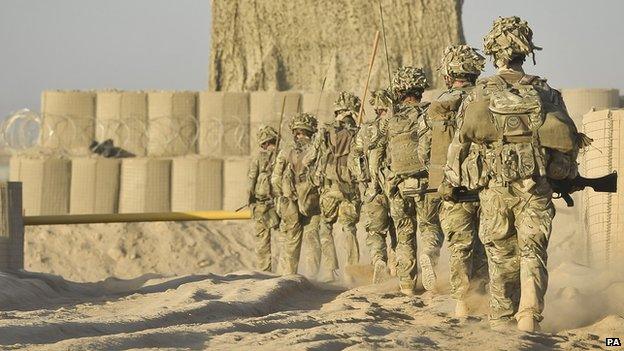Answers sought over Army's use of malaria drug mefloquine
- Published

Mefloquine is a once-a-week anti-malarial tablet for soldiers serving overseas
There are calls for the government to answer questions over a controversial anti-malaria drug given to UK soldiers.
A group of MPs says it wants to know how many servicemen and women have complained about side-effects after taking mefloquine - or Lariam as it is more commonly known.
The drug is given to soldiers serving overseas but can cause suicidal thoughts, anxiety, and depression.
The government argues that mefloquine's use is based on expert advice.
In the US the drug is banned from use by Special Operational Forces because of its potential side-effects.
'Deeply disturbing'
In a letter to Defence Secretary Michael Fallon, the defence select committee has asked what the government is doing to reassess the safety of the drug in the light of recent concerns about its safety.
In August, Conservative MP Johnny Mercer, a former Army office and Afghanistan veteran, called on the government to stop prescribing it until further research was carried out.
The letter also asks Mr Fallon what the government plans to do to help those who have suffered serious side-effects after taking it.
It says: "The use of Lariam is under increasing scrutiny and it is clear that the drug does not command the universal support of members of our armed forces.
"The number of cases of military personnel reporting serious side-effects after taking lariam is deeply disturbing and as a consequence the defence committee is minded to conduct an investigation into it use."

Antimalarial drugs
There are a number of different types of tablets that protect against malaria.
Mefloquine, or Lariam, is one example.
Others include doxycycline (Vibramycin-D) and atovaquone plus proguanil.
Any medicine can have side effects and you may need to take a short trial course of tablets before you travel to check this.
Ask your doctor, nurse or pharmacist providing travel health services which type of tablets you and your family need.


Lawyers say there is a growing number of military personnel seeking compensation for taking mefloquine
A growing number of service personnel want lariam stopped from being given to the military.
Medical experts from the UK, US and Australia have said the evidence suggests it should not be given to soldiers serving in environments where they need to be fully alert.
But the Ministry of Defence argues it is following Public Health England's medical advice and that the drug helps protects people from a life-threatening disease.
It says the drug is used by civilians and military personnel throughout the world and is only ever prescribed after an individual risk assessment.
But the defence select committee said it wanted to know why risk assessments were not carried out before 2013 when guidance for the drug's use said they should be.
Lawyers said there was a growing number of personnel who had come forward wanting compensation for taking the drug.
Phillipa Tuckman, a solicitor specialising in military law, said: "The law has been clarified recently and its absolutely clear that for many many years if you're being given treatment you need to have the consequences explained and reasonable alternatives need to be explained to you.
"If you're not having that discussion, you haven't given proper consent."

'Disturbing, vivid dreams'
Retired Lt-Colonel Andrew Marriott took lariam in 2002 and has had disturbing vivid dreams ever since, some of which he says have been "incredibly sinister".
"A standard nightmare might be something that involves a burning house or being attacked by snakes or something like that - those I'm prepared to talk about," he said.
"I've got daughters, wife, and a family and I don't really like the thought of them thinking that I have those thoughts going through my mind.
"How can it be that we have a situation where this loyalty and duty of care that should be delivered by the surgeon general and the defence chiefs is a complete deficit?
"That's actually the biggest thing I carry with me each day..."

The head of the Army, General Sir Nick Carter, said: "I'm aware that the medical profession is examining this at the moment and I will trust their judgement, but yes I absolutely care about the medicine we give our soldiers - absolutely care about it.
"If Public Health England comes forward supported by our military doctors that there is evidence that lariam is as dangerous as it perhaps might be, then of course I would support their opinion."
- Published17 August 2015
